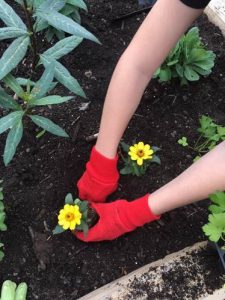Gardening in schools is more than a grade
University of Illinois Extension — June 27, 2019
School garden programs offer students hands-on, experiential learning that often is not available in a typical classroom (University of Illinois Extension)
School gardens offer so much more than beautifying school grounds. Imagine being able to dig in the soil to explore its make-up instead of looking at pictures, observe firsthand the act of pollination and the life cycle of plants from seed to seeds, or be inspired by the garden while writing an essay or painting a picture.
While so much emphasis is being put on the use of technology in the classroom, many kids today are missing out on the practical, hands-on experience right outside the school doors.
School garden programs offer students hands-on, experiential learning that often is not available in a typical classroom. Research has shown that school garden programs benefit youth and the community in many ways, including academics, healthy lifestyles & nutrition, social & emotional health, and environmental stewardship & connection to nature.
- Academics: Students gain practical, hands-on learning opportunities through gardening activities incorporated in a wide variety of disciplines, including science, social studies, math, language arts, visual arts, and nutrition.
- Healthy Lifestyle & Nutrition: By growing fruits and vegetables, children’s food attitudes and habits can change positively. They are more likely to eat vegetables they have grown themselves and share those preferences with others. While weeding, digging and doing other manual labor projects in the school garden, students are getting exercise while learning a useful skill.
- Social & Emotional Health: Experimenting in the garden can offer students a place to experience delayed gratification, independence, and motivation to succeed. Students can increase their overall life skills, such as teamwork, self-understanding, leadership, decision-making skills, communication skills, and volunteerism.
- Environmental Stewardship & Connection with Nature: Through a garden curriculum, students have an increased understanding of ecology, interconnections in nature, and responsibility to care for the environment.In a recent critical review exploring hundreds of past studies involving the effects of nature on youth learning (“Do experiences with nature promote learning? Converging evidence of a cause-and-effect relationship,” published in Frontiers in Psychology), Ming Kuo, associate professor in the Department of Natural Resources and Environmental Sciences from University of Illinois College of ACES and co-authors from University of Minnesota, found that time spent in nature boosts youth learning in eight distinct ways.
- “We found strong evidence that time in nature has a rejuvenating effect on attention; relieves stress; boosts self-discipline; increases physical activity and fitness; and promotes student self-motivation, enjoyment, and engagement,” Kuo explains. “And all of these have been shown to improve learning.”
An article from University of Illinois College of ACES, quoted Kuo as saying, “It is time to take nature seriously as a resource for learning, in fact, the trend of increasing indoor instruction in hopes of maximizing standardized test performance may be doing more harm than good.” School gardens can be an asset to every learner and teacher.
School curriculum can be connected to the garden through many different subjects, including math, science, language arts, health, art, social studies, music, and physical education. If your school in is interested in starting a school garden, reviving a current one, or connecting the curriculum to the garden, contact Brittnay Haag, University of Illinois Extension horticulture educator at bhaag@illinois.edu at the McLean County Extension Office at 309-663-8306.







